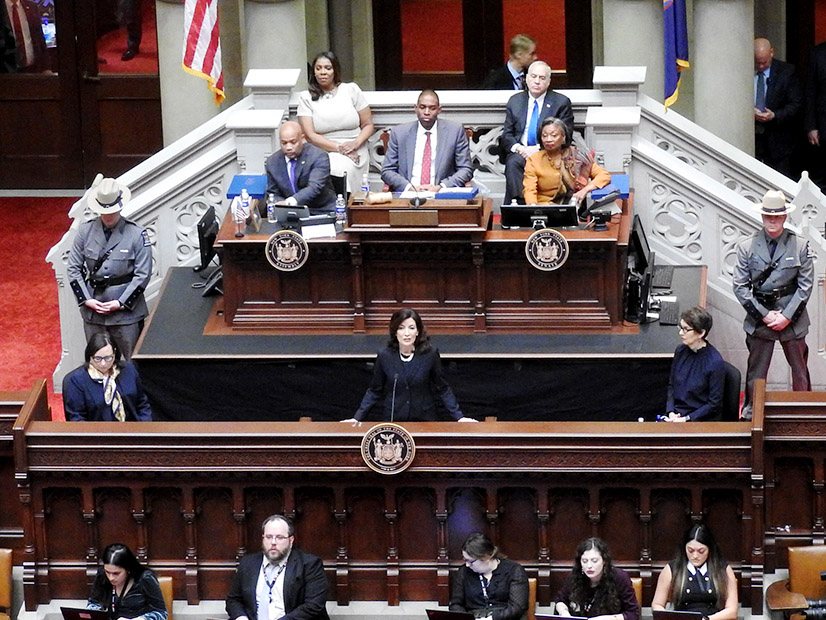New York Gov. Kathy Hochul (D) on Tuesday shared what her energy and environmental priorities will be in the coming year during the annual gubernatorial State of the State address, including implementing an economywide cap-and-invest program.
The goal of the program is to “cap greenhouse gas emissions, invest in clean energy, and prioritize the health and economic wellbeing of our families,” Hochul said. “Leading emitters will have to purchase permits to sell their fuels,” and “the dirtier the fuel, the bigger the price tag.”
“The invest part of the program will accelerate the clean energy transition and include universal climate action rebates” that will provide over $1 billion in revenue, which would be allocated “to lower utility bills, [and] cover transportation and other decarbonization efforts,” she said. It would give New York “great flexibility to focus our efforts on the biggest polluters” while providing relief to “our families, our famers and small businesses” from high energy costs.
Hochul’s speech covered many of the same, non-energy issues she pledged to tackle during her inauguration speech at the beginning of the year: crime, affordable housing and mental health care. But in both speeches, she emphasized the importance of reducing energy costs and electrifying New York’s building stock.
“Homeowners and renters worry about paying their energy bills because rates are at record highs, and geopolitical forces outside our control are hitting our wallets right here at home,” she said. This winter has seen “energy costs of 20 to 30% higher than just last year,” forcing many families to “make the terrible choice” between “keeping the thermostat up or food on the table.”
These conditions are exacerbated by the fact that New York’s building stock is old. (See “Barriers and Challenges,” Empire Building Challenge Seeks to Decarbonize NY High-rises.)
“They are less insulated, harder to heat and have higher greenhouse gas emissions,” accounting for a third of the state’s total emissions, said Hochul.
To counter rising costs, Hochul announced the creation of the EmPower Plus pilot program, which will “help low-income families retrofit their homes” to become electrified, she said.
The program will help low-income families insulate their homes, upgrade the energy efficiency of their appliances, switch their heating to electric systems, and reduce their overall economic burden by providing $200 million in relief to more than 800,000 New Yorkers, according to Hochul.
Additionally, homes that fully electrify will “be eligible for the first-in-the-nation energy affordability guarantee” that they “will never have to spend more than 6% of their income on electricity,” Hochul promised.
Hochul said that since the passage of the Climate Leadership and Community Protection Act (CLCPA) in 2019, the “legislature has instituted aggressive mandates and deadlines for reducing emissions, and now we’re executing on that plan.”
Other Notable Proposals
“Climate change remains the greatest threat to our planet, but also to our children and our grandchildren,” Hochul said, and so, alongside the cap-and-invest and EmPower Plus proposal, she announced several other climate action policies.
Hochul proposed “to end the sale of new fossil fuel power heating equipment by 2030” and called for “all new construction to be zero emission starting in 2025 for small buildings and 2028 for large buildings.”
She promised to implement these policies in “a thoughtful way that prioritizes affordability, protects those already struggling to get by, and corrects environmental injustices of the past.”
One other proposal, outside the energy and environment spheres, that Hochul claimed would help New Yorkers deal with high energy prices was her proposal to peg the minimum wage to inflation.
Reactions
The New York State Energy Research and Development Authority (NYSERDA) supported Hochul’s announcement to pursue a cap-and-invest program, saying it “establishes a declining cap on greenhouse gas emissions, invests in programs that drive emissions reductions in an equitable manner prioritizing disadvantaged communities, limits costs to economically vulnerable households, and maintains the competitiveness of New York industries.”
NYSERDA plans to immediately design the program, as recommended by the recently passed Climate Action Council (CAC) Scoping Plan. (See “Economy-Wide,” CAC Inches Toward Final Scoping Plan, Shares IRA Impacts.)
It said the program would “incentivize consumers, businesses and other entities to transition to lower-carbon alternatives” by requiring large-scale emitters to purchase allowances for their pollutive activities.
Doreen Harris, president of NYSERDA and co-chair of the CAC, said the “proposal furthers New York’s leadership by bringing forward an innovative solution to meet the profound challenges presented by the destructive nature of climate change.”
In the same statement, Basil Seggos, commissioner of the Department of Environmental Conservation, said his team “looks forward to working with NYSERDA, the legislature and New Yorkers across the state to build this essential program, which will also prioritize addressing pollution hotspots impacting the health and wellbeing of the state’s disadvantaged communities.”
Anne Reynolds, executive director of the Alliance for Clean Energy New York, said in a statement that “cap-and-invest is a powerful tool to reduce carbon emissions and pay for the portions of the climate Scoping Plan that are currently unfunded.”
Rory Christian, chair of the Public Service Commission, commended Hochul, saying she is “providing unprecedented financial relief to utility ratepayers,” while her “new and innovative energy affordability initiatives are coming at exactly the right time.”
In an email to NetZero Insider, Julie Tighe, president of the New York League of Conservation Voters, said, “Gov. Hochul met the environmental moment.”
“With a focus on environmental justice, she’s setting the state on a course for a clean energy economy that works for everyone no matter their zip code,” Tighe said.



